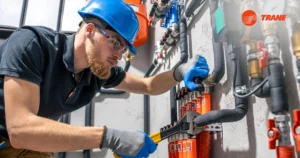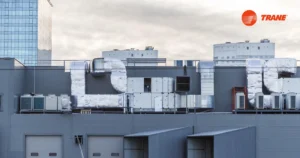Introduction: The Essential Role of process cooling
Modern manufacturing is defined by precision, speed, and efficiency. Whether producing pharmaceuticals, food and beverages, or high-tech electronics, the quality of goods depends heavily on stable environmental conditions. Among these, process cooling plays a pivotal role. By maintaining exact temperature levels across machinery and production environments, businesses protect product quality, reduce downtime, and ensure compliance with industry standards. As global demand for high-quality manufacturing grows, effective cooling strategies are now seen as a cornerstone of competitiveness.
Why Temperature Stability Matters in Manufacturing
Production environments are complex ecosystems where even minor fluctuations in temperature can have serious consequences:
- Product Integrity: Food and pharmaceutical products may spoil, or their chemical composition may alter, without stable cooling.
- Equipment Performance: Overheated machinery suffers higher wear and risks sudden breakdowns.
- Compliance Risks: Regulated industries face strict requirements for quality and safety.
- Energy Costs: Inefficient systems consume more power, raising costs and environmental impact.
For manufacturers, cooling is no longer just a utility; it is a strategic safeguard for growth and customer trust.
Challenges Without Effective Process Cooling
Industries that lack robust cooling face recurring problems:
- Downtime: Production lines are halted when temperatures exceed tolerances.
- Waste: Spoiled or damaged goods increase material costs.
- Reduced Yield: Fluctuations impact batch consistency and final output.
- Reputation Damage: Clients expect reliability, and failures weaken long-term contracts.
These challenges underline why cooling systems must be integrated into business strategy, not treated as secondary infrastructure.
Industries That Depend on Process Cooling
The applications of process cooling span multiple industries, each with unique needs:
1. Food and Beverage
From dairy processing to frozen goods, cooling preserves product safety and extends shelf life. Consistency is non-negotiable when customer health and regulatory compliance are at stake.
2. Pharmaceuticals
Stable environments are critical for vaccine storage, chemical formulation, and laboratory conditions. Any deviation risks regulatory breaches and costly recalls.
3. Electronics and Semiconductors
Microelectronics and semiconductors generate significant heat during production. Cooling ensures precision and prevents defects.
4. Chemicals and Plastics
Temperature control stabilises reactions, ensuring product quality and safety in high-risk environments.
5. Data Centers
Though not traditional manufacturing, data centers increasingly adopt process cooling to protect servers that form the backbone of digital infrastructure.
Each sector demonstrates the universal truth: without reliable cooling, production quality and safety cannot be guaranteed.
Advantages of Advanced Cooling Solutions
Modern process cooling goes beyond basic temperature regulation. Innovations deliver measurable business advantages:
- Scalability: Modular systems that expand alongside business growth.
- Efficiency: Digital controls and eco-friendly refrigerants reduce energy use.
- Reliability: Predictive maintenance prevents failures before they disrupt operations.
- Flexibility: Systems designed for both permanent installation and temporary deployment.
These advancements transform cooling into a strategic tool for competitive advantage.
The Sustainability Imperative
Manufacturers today face dual pressures: grow output while reducing environmental impact. Cooling systems are among the largest energy consumers in industrial facilities, making efficiency critical. Advanced systems support sustainability by:
- Lowering energy intensity through optimised controls.
- Using refrigerants that align with global environmental regulations.
- Reducing waste by protecting product quality and avoiding production losses.
For companies working toward net zero targets, process cooling is a high-impact opportunity to cut emissions while maintaining quality.
The Role of Digitalisation in Process Cooling
Digital transformation is reshaping cooling management:
- IoT Sensors provide real-time monitoring of system performance.
- Predictive Analytics forecast potential breakdowns and optimise maintenance schedules.
- Automation adjusts cooling dynamically to match production loads.
By integrating these technologies, manufacturers gain tighter control over energy use, compliance, and output.
Why Trane Is the Partner of Choice
While many providers offer cooling equipment, Trane distinguishes itself through:
- Over 135 years of engineering expertise in HVAC and cooling solutions.
- Global presence with local support, ensuring rapid deployment and service.
- Customised designs tailored to each industry’s production requirements.
- Sustainability focus, embedding efficiency into every solution.
- Comprehensive services, including installation, monitoring, and long-term maintenance.
This combination makes Trane not just a supplier, but a trusted partner in business resilience and sustainability.
The Business Case for Investing in Process Cooling
For decision-makers, the value of robust cooling can be framed in three ways:
- Operational Continuity: Minimises downtime and protects equipment.
- Regulatory Compliance: Ensures alignment with industry standards.
- Financial Performance: Reduces waste, improves efficiency, and lowers long-term costs.
By viewing cooling as a strategic investment, manufacturers build resilience while unlocking efficiency gains that improve competitiveness.
Conclusion: Building Flexibility with heating rental
The global manufacturing sector cannot function without reliable cooling. It underpins safety, compliance, and customer trust while enabling businesses to scale operations sustainably. For forward-looking organisations, investing in advanced systems is no longer optional — it is a necessity. Trane delivers innovative solutions that combine efficiency, digital intelligence, and long-term support, helping manufacturers achieve excellence under pressure. And for facilities requiring additional flexibility, Trane also provides scalable heating rental services, ensuring comfort and productivity remain uninterrupted across seasonal and operational challenges.




